|
|
|
Sort Order |
|
|
|
Items / Page
|
|
|
|
|
|
|
| Srl | Item |
| 1 |
ID:
155180


|
|
|
|
|
| Summary/Abstract |
The first decade of the twenty-first century saw the chants of the rise of an Indian superpower. These claims of the twenty-first century as India’s century were not only based on the massive economic growth that the country saw in the post-1991 liberalisation period, and the concomitant boost in military infrastructure, but also by virtue of its having the biggest functional democracy, an influential multi-million plus diaspora, the sway of Bollywood in the region and abroad and the spectacular religious-linguistic diversity of the country. From conducting mega disaster-relief operations during the 2004 tsunami to effectuating the world’s largest civil evacuation during Operation Rahat, India has ceaselessly augmented its soft power potential to project its national power in the region. This article is an attempt to analyse the possibilities and challenges that India faces in the effective functioning of its soft power in the region. It also remarks as to how India’s soft power limitations can be quashed by integrating a smart power approach in its foreign policy by strengthening existent digital and public diplomacy infrastructure.
|
|
|
|
|
|
|
|
|
|
|
|
|
|
|
|
| 2 |
ID:
170080
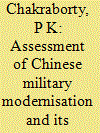

|
|
|
|
|
| Publication |
New Delhi, Pentagon Press, 2019.
|
| Description |
xvii, 182p.hbk
|
| Standard Number |
9789386618917
|
|
|
|
|
|
|
|
|
|
|
|
Copies: C:1/I:0,R:0,Q:0
Circulation
| Accession# | Call# | Current Location | Status | Policy | Location |
| 059813 | 355.033051/CHA 059813 | Main | On Shelf | General | |
|
|
|
|
| 3 |
ID:
189196
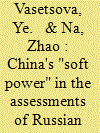

|
|
|
|
|
| Summary/Abstract |
IN THE first quarter of the 21st century, China's influence in the world has risen considerably, drawing the interest of researchers from various countries. Analysts curious about the driving forces of this success agree that "China's peaceful rise" has largely been due to the use of "soft power" tools. The 2022 Winter Olympics is a pertinent example: They offered the world an image of a successful China and a symbolic victory over the COVID-19 pandemic.
|
|
|
|
|
|
|
|
|
|
|
|
|
|
|
|
| 4 |
ID:
125993
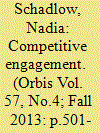

|
|
|
|
|
| Publication |
2013.
|
| Summary/Abstract |
America's instruments of foreign policy are weak. As a result, Washington depends much more on its military power than it should. The militarization of foreign policy is neither good for American interests nor sustainable, since many political, economic, and ideological outcomes are not attainable through the use of military force. Yet ongoing discussions about America's non- military power miss one important factor: in virtually every theater of the world, local, regional, and strategic competitions affect America's ability to exert influence through its aid and diplomacy. From Pakistan to the Middle East to Africa, ideas about how to develop economies, shape educational systems, administer health care programs, and build political institutions, are contested. Until the competitive nature of aid and diplomacy is deliberately and explicitly considered, Washington's ability to achieve outcomes using its non-military power-often called "soft" or "smart power"-will remain fundamentally limited.
|
|
|
|
|
|
|
|
|
|
|
|
|
|
|
|
| 5 |
ID:
168510
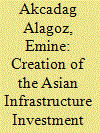

|
|
|
|
|
| Summary/Abstract |
The aim of this article is to assess the creation of the China-led Asian Infrastructure Investment Bank within the scope of China’s smart power strategy, which will help not only to analyze China’s strategic use of its coercive and co-optive capacity, but also to understand better the concept of smart power. Given that the wisdom of statecraft can only be situationally determined, through this study I will propose the ability to achieve targeted objectives, the skill to use hard and soft power instruments in such a way that they reinforce each other, good interpretation of the existing regional and global contexts, time planning, and compatibility with long-term interests as criteria for judging the effectiveness of a smart power implementation.
|
|
|
|
|
|
|
|
|
|
|
|
|
|
|
|
| 6 |
ID:
130668
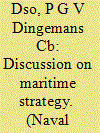

|
|
|
| 7 |
ID:
095201
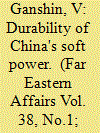

|
|
|
|
|
| Publication |
2010.
|
| Summary/Abstract |
After successfully hosting the Olympic Games, it seems as though China now finds itself in a new process of self-identification. With the proliferation of crisis situations globally, China's earlier status and weight in international affairs could hardly serve to strengthen its international positions. Meanwhile, Beijing states resolutely that it will never become a "superpower," and that its ascent and marshalling of might presents no threat whatsoever to other members of the world community. China intends to conquer its new heights by exclusively peaceful means, with the help of so-called soft power. To accomplish this, it is ready in the future to seek mutual understanding with other nations and peoples through increased cultural exchanges, promoting the attractiveness of its model of socioeconomic development, and convincing others of its sincerity.
|
|
|
|
|
|
|
|
|
|
|
|
|
|
|
|
| 8 |
ID:
148301
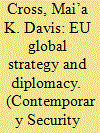

|
|
|
|
|
| Summary/Abstract |
The new EU Global Strategy has significant implications for EU diplomacy, in terms of both goals and means. This article first analyses the timing of the strategy as an exercise in diplomacy in its own right. Second, it argues that the strategy outlines a more expansive and noticeably more smart power-oriented approach to diplomacy in practical terms. Finally, it notes that the strategy has a new meta-narrative for EU diplomacy, which seeks to project a blend of both realistic assessment and idealistic aspiration.
|
|
|
|
|
|
|
|
|
|
|
|
|
|
|
|
| 9 |
ID:
108379
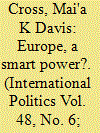

|
|
|
|
|
| Publication |
2011.
|
| Summary/Abstract |
Smart power is defined as the effective combination of both hard and soft power. The concept is increasingly used in policy and academic debates, yet a clear understanding of what it actually means is still lacking. As a result, there is little serious consideration of how smart power can contribute to long-standing debates about power in international relations. This article seeks to clarify the meaning of smart power through first analyzing its main components - hard and soft power - separately; and second bringing these components together to re-conceptualize smart power. The aim is to make smart power more analytically useful, and to outline the various ways in which hard and soft power can be combined effectively. The author considers the case of Europe to argue that it is mainly a soft power and sometimes a smart power.
|
|
|
|
|
|
|
|
|
|
|
|
|
|
|
|
| 10 |
ID:
103515
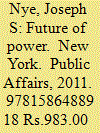

|
|
|
|
|
| Publication |
New York, Public Affairs, 2011.
|
| Description |
xviii, 300p.
|
| Standard Number |
9781586488918
|
|
|
|
|
|
|
|
|
|
|
|
Copies: C:2/I:0,R:0,Q:0
Circulation
| Accession# | Call# | Current Location | Status | Policy | Location |
| 055944 | 303.33/NYE 055944 | Main | On Shelf | General | |
| 056093 | 303.33/NYE 056093 | Main | On Shelf | General | |
|
|
|
|
| 11 |
ID:
186876
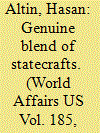

|
|
|
|
|
| Summary/Abstract |
Power transition in the international order and the position of China in this order have triggered ramifications in China's foreign policy strategy toward the Middle East and North Africa (MENA) region. Its foreign policy approach has evolved from strict non-intervention to an assertive policy at the international level and constructive engagement at the regional level. China has simultaneously been applying both soft and hard power to protect its national interests in MENA. This study aims to assess China's four-pillar MENA policy from the perspective of its smart power strategy by examining its hard power means and soft power tools.
|
|
|
|
|
|
|
|
|
|
|
|
|
|
|
|
| 12 |
ID:
186871
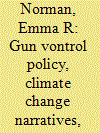

|
|
|
|
|
| Summary/Abstract |
At the time of writing this Editor's Note, it has been but a few weeks since the horrifying school shooting in Uvalde, Texas on May 24, 2022, that killed 19 children and two teachers, and the supermarket massacre of ten people in Buffalo, New York ten days earlier. Both lone gunmen were 18 years old and both used legally acquired AR-15-style weapons (Edmondson 2022). The events catapulted gun control debates again into the headlines and culminated in swift legislation proposals in Congress. On June 8, 2022, a bitterly divided House—voting largely along party lines—approved a stricter gun control bill package by 223 to 204 votes but also revealed the partisan chasm that continues to afflict passing effective firearms control legislation in the United States. Among other things, the bill would ban under-21s from legally purchasing semiautomatic rifles, increase requirements for gun storage in private households, and prohibit the sale of magazines holding over 15 rounds (Edmondson 2022). The acrimonious arguments in the House were predictably partisan with Democrats focusing on protecting children from gun violence while Republicans highlighted that the proposal would violate Second Amendment rights. Representative Jim Jordan (R-OH; cited in Edmondson 2022), opined that protecting children “is important—it sure is. But this bill doesn't do it. What this bill does is take away Second Amendment rights, God-given rights, protected by our Constitution, from law-abiding American citizens.”
|
|
|
|
|
|
|
|
|
|
|
|
|
|
|
|
| 13 |
ID:
141059


|
|
|
|
|
| Summary/Abstract |
Ideas of smart power and Global Health Diplomacy have developed considerable prominence over the past decade in, respectively, the foreign policy and public health communities. Although in some respects separate, both suggest the potential for using health assistance to generate political as well as health benefits. The conflicts in Iraq and Afghanistan provide an opportunity to examine these assertions at the ‘sharp end’. We consider both the health and wider strategic benefits of health assistance in these conflicts, as well as some of the ethical challenges involved. We conclude however that we should adopt the precautionary principle because: there is doubt over the quality of health services provided in such circumstances; concern over the wider effects of politicising health aid; and little proof that the claimed strategic benefits materialise in practice.
|
|
|
|
|
|
|
|
|
|
|
|
|
|
|
|
| 14 |
ID:
125304
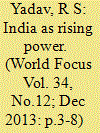

|
|
|
|
|
| Publication |
2013.
|
| Summary/Abstract |
Thus, India has potential to be considered as an important power in the international system, but it is imperative for its policy makers to visualize them in proper perspective and realized them with skilful diplomatic maneuvering. For this it has to shun its defensive posture and reluctance to transform its capacities into capabilities. This can only be attained through its strong domestic input, along with enhanced external capabilities to engage its regional and global clout in its favour. Thus, India can neither achieve this status by just becoming a 'hard' or a 'soft' power alone, but can attain it by becoming a 'smart' power utilizing the virtues of both.
|
|
|
|
|
|
|
|
|
|
|
|
|
|
|
|
| 15 |
ID:
117664
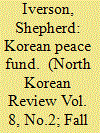

|
|
|
| 16 |
ID:
186847
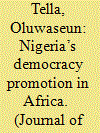

|
|
|
|
|
| Summary/Abstract |
Democracy promotion is undoubtedly one of Nigeria’s most important foreign policy objectives in Africa. Indeed, it has featured in the state’s foreign policy across successive administrations including military and civilian regimes. A fundamental question explored by this article is the dimension of power Nigeria deploys in its foreign policy objective of democracy promotion in Africa. Is it hard or soft, or a combination of the two (smart power)? Using three case studies – Sierra Leone, São Tomé and Príncipe and The Gambia – the article reveals that Nigeria has deployed all three dimensions of power. While this reflects the peculiar circumstances of these particular states in constitutional crisis, Nigeria’s domestic situation, including the type of political system (democratic or authoritarian) and the personality of the president at a given time, as well as trends in the global arena, are also germane. By its very nature, democracy promotion depends on a state’s soft power as the admirable domestic values of the soft power state attract other states to emulate its democratic practices. However, as the case study of Nigeria shows, a state can deploy soft, hard or smart power in its quest to promote democracy depending on the domestic circumstances of both the soft power and recipient states.
|
|
|
|
|
|
|
|
|
|
|
|
|
|
|
|
| 17 |
ID:
111569
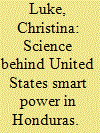

|
|
|
|
|
| Publication |
2012.
|
| Summary/Abstract |
The cultural heritage of Honduras offers a critical platform for United States heritage diplomacy under the United States Department of State, Bureau of Educational and Cultural Affairs, Cultural Heritage Center. Of specific note is the formal 2004 Honduran-American Memorandum of Understanding for the preservation of cultural property and, beginning in 2001, periodic projects under the Ambassadors Fund for Cultural Preservation. The diplomatic efficacy of American cultural heritage policy and the Ambassadors Fund comes from long-term, sustained funding from the National Science Foundation, the National Endowment for the Humanities, and the Fulbright Program. Established networks by archaeologists have enabled the successful re-entry of United States cultural diplomacy in Honduras in the last decade.
|
|
|
|
|
|
|
|
|
|
|
|
|
|
|
|
| 18 |
ID:
131047
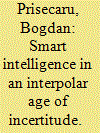

|
|
|
|
|
| Publication |
2014.
|
| Summary/Abstract |
Concepts are the filters usually used when trying to add labels to various aspects of reality and explain what is occurring. Thus, most of the time the concepts evolve behind the events and represent the result of a series of interactions within a certain period of time.
Contemporary perceptions of world events were highly influenced by the Cold War period when the threat of mutually assured destruction was synonymous with the end of the world as known until that time, but it also meant forty-five years of relative equilibrium.
|
|
|
|
|
|
|
|
|
|
|
|
|
|
|
|
| 19 |
ID:
098087
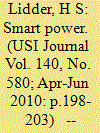

|
|
|
| 20 |
ID:
137255
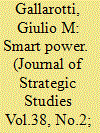

|
|
|
|
|
| Summary/Abstract |
The analyses of smart and soft power have developed little beyond what their critics would refer to as ‘soft theory’, and in both cases the theoretical development is less than ‘smart’. This article attempts to address these deficiencies in the theoretical development of smart power by: (1) articulating a more rigorous and systematic understanding of the processes of smart power; (2) explaining how changes in world politics have raised the value of smart power relative to hard power; (3) analyzing smart power in the context of recent US foreign policy, and (4) proposing several prescriptions that will encourage decision-makers to value and effectively use smart power strategies in their foreign policies.
|
|
|
|
|
|
|
|
|
|
|
|
|
|
|
|
|
|
|
|
|